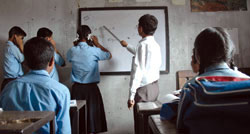 When her parents left Niva Atreya, 15 and her younger brother to go and work in the US, they put their children in separate schools little realising how lonely they would be. In June, Niva was enrolled in Maryland Public Higher Secondary School, where she was desperately trying to make new friends. With only a grandmother at home, Niva's parents perhaps thought their extrovert daughter would be better off in the school's hostel.
When her parents left Niva Atreya, 15 and her younger brother to go and work in the US, they put their children in separate schools little realising how lonely they would be. In June, Niva was enrolled in Maryland Public Higher Secondary School, where she was desperately trying to make new friends. With only a grandmother at home, Niva's parents perhaps thought their extrovert daughter would be better off in the school's hostel. One day Niva's teacher hit her in class with a duster and the vice-principal made things worse by striking her with a bamboo stick. The humiliation the girl felt drove her to desperation and on 6 June she swallowed Metacide, a pesticide. She died a slow and agonising death six days later in hospital.
Investigations by child rights agencies show Niva was suffering from depression and stress. But there are suggestions that the punishment she received for doing what children do, make noise, and her resulting depression triggered the girl's extreme action. If the school had a professional student counsellor who had listened to her problems, Niva might still be alive.
"Both teachers and students are under immense stress but because counselling is still new here, unfortunate incidents like these take place," says Devendra Ale, a former teacher now working with Centre for Victims of Torture (CVICT). Ale admits using corporal punishment himself as a teacher to discipline students but says his perceptions changed once he started working with victims of torture. "The idea of using violence to quell violence begins with teachers and family members punishing a child to discipline them," he says, "the physical pain subsides but the mental scars will remain."
Many Nepalis still accept the idea of using corporal punishment to 'discipline' and mould a child. Religious scriptures that encourage strict disciplining via punishment further endorse the traditional formula of educating with the fear factor.
Today, parents still pull teachers aside and permit them to 'give a few slaps' to discipline their wards. A Nepali child is expected to learn the hard way and that's where things go wrong. "It is more important to listen and understand the child than to try and treat the problem by beating. Half our problems would be solved if we listened to them," says Bharat Adhikari of the child welfare group, CWIN.
Most private schools claim their teachers are strictly instructed to not punish students physically or to verbally abuse them, but with no formal training on child development and psychology, Nepali teachers are hardly able to understand the consequences of what seem like harmless acts. Calling students derogatory names or administering the cane or duster is common.
One primary school teacher in Pokhara made his students lick human faeces when they couldn't memorise their maths tables. A UNDP report in 1998 showed that 14 percent of school dropouts in Nepal claimed to have quit because they feared a teacher. CWIN reported 188 recorded cases of corporal punishment in Nepali schools in the first half of 2002 alone.
Fr Bill Robins, principal of St Xavier's School, believes it is not the punishment but the way it is administered that makes the difference. "A whack in the back doesn't hurt anyone. It is more important to make the child understand why he is being punished. If you can balance punishment with love, the child will understand why he is being punished," he says.
National Private and Boarding Schools of Nepal which has over 8,000 member schools in 48 districts, is working to train principals and teachers to change their approach and to discipline students using counselling. "Subject teachers cannot identify psychosocial behavioural problems: we need counsellors for both students and teachers," says the group's Karan Shah.
Until recently the law allowed parents, teachers and guardians to administer physical punishment if they felt it necessary. This changed when child rights activists filed a case in the Supreme Court and won. On 6 January the court deleted this clause in the law but, sadly, not one circular has been sent to schools from the government informing them of the change.


